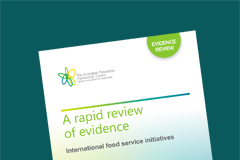International food service initiatives
Background
The purpose of this rapid review commissioned by the Australian Government Department of Health is to better understand the evidence surrounding food health initiatives in the food service sector. This review aims to help identify effective evidence-based strategies within the food service sector that can be implemented and evaluated with the broad goal of improving the foods offered, promoted, purchased and consumed out of the home; in order to reduce the public health burden of obesity and diet-related health problems in Australia over the longer term.
The review aimed to address the following questions:
- Describe the schemes that have been implemented in Australia and internationally to focus efforts of the food services sector to improve the healthiness of the menu choices or nutrition information for customers
- What evidence is there of the effectiveness of any of the schemes identified in Question 1.
Key findings
- This review identified schemes operating in the food service sector that aimed to improve consumer health, however, the evidence base is small and inconclusive.
- The findings indicate that awareness-raising schemes when used in isolation are ineffective, and actions beyond increasing awareness are needed to effect change. Although some schemes employed strategies that were structural in nature, thereby changing the food environment to improve consumer health, the effect of these schemes on consumer health was not measured.
- Schemes employed in the food service sector to improve consumer dietary health offer considerable potential to improve the nutritional quality of foods offered, promoted, purchased and consumed out of the home; and are offered to reduce the public health burden of obesity and diet-related health problems in Australia over the longer term.
- Some schemes have been implemented, but many have been awareness raising and generally ineffective.
- Some schemes are more extensive, but the effect of these schemes on consumer choice and health has not been measured.
- Although findings indicate businesses will engage with schemes to improve consumer health, this must be interpreted cautiously as the evidence also indicates that businesses will choose actions that can be implemented without effort.
- More effort needs to be directed towards evaluating the effect of food service schemes on consumer health using robust research designs to build the evidence base.
